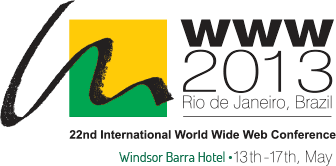The use of big data and social networks for public health purposes has gained attention in recent years with the spread of social networks and with the availability of on-line data systems. Analysis and data exchange in health systems can help prevention and monitoring of diseases. Social networks can facilitate the control of infectious diseases. These are some of the latest lines of research on the Internet and they are featured for the first time at the WWW Conference.
Medical innovations: Twitter epidemics
The first International Workshop on Public Health in the Digital Age: Social Media, Crowdsourcing and Participatory Systems will take place in Rio de Janeiro, on May 14th, 2013. Building on previous events: ehealth 2009-11 (http://electronic-health.org/
Carl Koppeschaar talks about InfluezaNet at Rapid Fire Talk at Digital Disease Detection Conference 2012
“Dengue Web” is a collaborative Dengue disease monitoring system used in Salvador, Brazil. Participants receive a weekly newsletter with news and curiosities about dengue, and are asked to answer if they have felt dengue symptoms during the previous week, even if they don’t have the disease. The collected data are analyzed in real time by researchers from the Institute of Collective Health, from Federal University of Bahia, and made available on-line in the form of curves of incidence, georeferenced maps, databases for research purposes, among other forms of visualization.
The idea to collect and analyze “real-time” data on Dengue epidemics with the aid of the Internet and voluntary participation of citizens was inspired by Gripenet, a similar project developed in 2003 in Holland, and then extended to Portugal and Spain.
Other works, projects and tools to be presented at the workshop include:
• HealthMap
• Influenzanet
• GPHIN
• Medisys
• crowdbreaks
• CeRC Twitter Epidemics
• BioCaster
• MappyHealth
• Flu Near You
• PULS
• ProMED-mail
• Bio.Diaspora
• Google Flu Trends
As the workshop organizers explain on their official website, “the enormous potential to improve public health through harvesting, analysis, and visualization of Big Data cannot be more clearly expressed. Public health needs to leverage cutting-edge computer science and the availability of real time Big Data from social networks, blogs, games and 24×7 online media providing a constant stream of real time situation-aware data to be harnessed, analyzed and rapidly utilized in order to increase public participation and avoid public health threats. Finally, thanks to social media and social networks, risk communication and public information about health threats takes place online in conjunction with official and traditional health communication channels”.
The workshop will also feature a panel with experts from public health agencies including World Health Organization (WHO), TEPHINET, Science in Action and others. See the full programme below, and get some inspiration to create similar projects in your city.
_ Full Papers
Integrated Digital Public Heath Dashboard: the Vision and Challenges
_ Short Papers
Validating Models for Disease Detection Using Twitter
Combining Twitter and Media Reports on Public Health Events in MedISys
Vaccine Attitude Surveillance Using Semantic Analysis: Constructing a Semantically Annotated Corpus
_ Abstracts
A Proposal for Automatic Diagnosis of Malaria
Participatory disease surveillance in Latin America
Crowdsourced risk factors for ILI in Mexico
_ Posters
Influenzanet: influenza-like illness surveillance based on self-reporting volunteers on the Internet
Big Data Analysis in Preventive Medicine: New Opportunities.
Disease Radar: Measuring and Forecasting the Spread of Infectious Diseases and Zoonoses
Applying machine learning to detect gender differences in alcohol use patterns in Metropolitan Region of São Paulo, Brazil
DENGUENAWEB: Internet Based Monitoring System for Dengue in Salvador – Bahia – Brazil



















